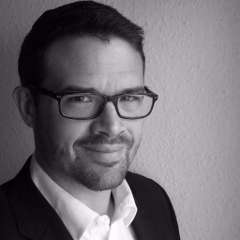So staggered and diluted has the process of the Staatsoper’s reopening been that this first night of its new Hänsel und Gretel hardly felt like an event at all. The great and the good had been assembled for the previous evening’s 275th anniversary concert, but for the first operatic performance in reopened house – I’m inclined not to count the ill-advised and ill-executed staging of Schumann’s Faust-Szenen in October – a few balloons on the building’s scrubbed-up façade was about it.
It proved appropriate for what turned out to a production that likewise offered very little sense of occasion. In fact, Achim Freyer’s staging sapped just about everything from Humperdinck’s joyous, life-enhancing work: its humanity, its magic, its drama and, above all, its heart.
The stage offered his usual tabula rasa, the playing area enclosed by black cloth scrawled with scribbles and twinkling with LED stars. Revolving mirrored doors stood at the back; a disco ball hung up on the top right. The upper reaches of the stage seemed to be out of bounds, so a walkway extended out over the orchestra and into the auditorium. A plastic frog, jerked arbitrarily back and forth, sat at the back of the orchestral pit.
A pantomime cat and remote controlled mouse were among the many colourful creatures that populated the show, introduced from an early stage. An oversize, faceless chef full of holes was a metaphor, I assume, for hunger; the Sandman was a triangular, faceless Santa Claus, accompanied by an oversized bag of presents secreting clouds of glitter as it shuffled about. The dream sequence, overseen by a grotesque ringmaster, featured an array of bizarre circus acts.
Alongside some vague “aphorisms about the concept” from Freyer, the programme quoted Novalis’s description of fairy tales as representing the “real anarchy of nature” and “a dream world without context”. And some of these images might sound beguiling enough: Freyer still undeniably has a good line in memorable costumes. But the director and his two(!) credited dramaturgs seemed to have forgotten that Humperdinck’s opera also tells a story, and it’s a story needs to be deeply rooted in some sort of context if it’s going to count for anything: either its own – in childhood, in nature, in the neuroses that plague us all somewhere deep down – or a coherent alternative.
Freyer offered neither. With stark lighting and his black background, nature – anarchic or otherwise – could only be conjured up by handing yet more supernumeraries spares from the dressing-up box. Most harmful of all, though, was the fact that Hänsel and Gretel were themselves reduced to nightmarish visions encased within grey giant heads, with goggly eyes their only moveable parts. It was impossible to identify with these inexpressive creatures, and the drama was, as a result, entirely neutralized. I was made suddenly aware, moreover, of how important physicality, so well conveyed in Humperdinck’s music, is in these roles; you need mouths, to take just one small example, to carry out all the gobbling and nibbling that gets them into such trouble.
Matters reached a nadir in the lamely staged encounter with the witch, her face an unholy mishmash of sweets as eyes, sausages as mouth and a long pink protuberance – rendered only marginally less obscene by the addition of a polished nail – as a nose. These two dead-eyed children took her on first as wobbly oversized puppet, while Stephan Rügamer – his soft-edged, underwhelming tenor sorely inadequate for the role – sang from the wings. Things didn’t improve much when he appeared in costume later in the scene, while a quick nod to commercialism in the projections felt like an afterthought. The stagecraft here, clearly designed to offer something charming and naïve, simply felt inept. The result was crushingly, dispiritingly uninvolving.
I felt sorry for the hard-working ensemble cast. Elsa Dreisig’s Gretel was beautifully sung with clear, pearly tone, and she was well matched – perhaps rather too much so – by Katrin Wundsam’s Hänsel. As they took of their masks as part of laboriously choreographed curtain calls, it became clear how much more involving the whole show would have been if we’d been able to see their faces.
Corinna Scheurle and Sarah Aristidou were charming as the Sandman and Dew Fairy. Roman Trekel was dry-voiced as the Father, in garishly over-the-top garb, and Marina Prudenskaya sang strongly as the Mother (polka dot dress, pig-tails and clown makeup). But her heartbreaking brief lament in Act 1, accompanied for no very good reason by a gentle trickle of bubbles, was just one of several moments in this glorious score that Sebastian Weigle let pass by unnoticed in conducting that was disappointingly routine and short on atmosphere.




